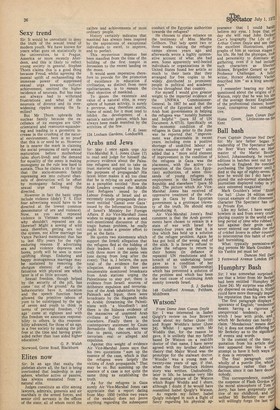Sexy trend
Sir: It would be unrealistic to deny the truth of the sexual trend of modern youth. We have known for years what goes on statistically in the universities, be it Prague, America or more recently Aberdeen, and this is likely to reflect young society in general. Stephen Thorn claims this is a good thing because Freud, whilst agreeing the mental uplift of rechannelling the immense power of suppressed sexual urge towards cultural achievement, omitted the higher incidence of neurosis. But has man not always had to withstand frustrations and what of the neurosis of divorce and its everwidening ripples among the families?
But Mr Thorn upbraids the nuclear family because the excellence of its energies are GNPorientated and reseource-squandering and leading to a geometric increase in the crushing of the natural environment, here is no proof that this is or need be so. However he is nearer the mark in claiming the social pressures of early sexual maturation before motherhood (also short-lived) and the demand for equality of the sexes is making monogamy as the rule less hard to sustain. Thus he claims a tit for tat that the socio-economic family repressing sex into cultural channels of destruction will be offset by monogamy failing and the sexual urge not being thus directed.
However in fact the basic urges include violence (didn't T. S. Eliot fear advertising would have to be directed at the lowest common denominator of sex and violence). Now, as you said, repeated violence in Vietnam numbs and why shouldn't repeated sex do likewise? Might a sowing of wild oats therefore, getting sex out the system, not allow marriage (as Vance Packard maintains) that has to last fifty years for the right enduring reasons. If advertising sex and violence depraves and bores, profit will be seen in more uplifting things. Enduring and happy monogamous marriage may be sustained by removing the shotgun element of early infatuation with physical sex which later is of so little account.
Sexual freedom, though helped by the security of the pill, has come 'out of the ground.' As the behaviourists have it, education and the speech function have allowed the primitive taboos of yore to be outstripped by the age of seven and youth to think in terms of personal freedom. 'Of age' come at eighteen and with this freedom we associate responsibility to others. Is this responsibility advanced, for those of an age, in a free society by making the pill free at the time and having grantaided rather than loan aided higher education?
G. P. Walsh Norwood, Gorse Road, Blackburn






















































 Previous page
Previous page